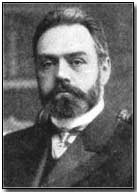Who's Who - Alexander Guchkov
 Alexander Ivanovich Guchkov
(1862-1936) served as leader of the Octobrist Party in the wake of the 1905
Russian Revolution, and was a moderate figure arguing in favour of
constitutional reform prior to and during World War One.
Alexander Ivanovich Guchkov
(1862-1936) served as leader of the Octobrist Party in the wake of the 1905
Russian Revolution, and was a moderate figure arguing in favour of
constitutional reform prior to and during World War One.
Born on 26 October 1862 in Moscow the son of a wealthy merchant, Guchkov was educated at Moscow and Berlin universities before entering the Russian army.
Having fought in the Second Boer War of 1899-1902 against the British, Guchkov's role in the subsequent disastrous Russo-Japanese War of 1904-05 was as head of Russian Red Cross operations.
With Tsar Nicholas II's political concessions in the wake of the 1905 Revolution, creating a constitutional monarchy, Guchkov was instrumental in founding the moderate Octobrist Party, dedicated to enacting the Tsar's stated manifesto.
From 1910-11 Guchkov acted as president of the State Duma, although by this stage he was growing increasingly disillusioned with the royal court's apparent desire to agree necessary reforms. He was a notable public critic of the Tsar and Tsarina's close advisor Grigory Rasputin, at one stage publicising correspondence between the two directed at discrediting the latter (for which the Tsarina unsuccessfully demanded of the Tsar that Guchkov be hanged).
The onset of war in August 1914 saw Guchkov initially return to his former position as head of the Russian Red Cross movement. The following year he was appointed chairman of the Central War Industries Committee - a body treated with suspicion by the government on account of its virtually independent management of the production of war supplies and their transportation to the front.
Guchkov was rumoured, in late 1916, to have conspired with the military high command to overthrow Nicholas II in order to save the monarchy. In the event he was spared the effort by the advent of the February Revolution of 1917. Despite ill-health (having suffered two heart attacks in 1916) Guchkov travelled to Pskov to take delivery of the Tsar's formal abdication notice.
Although he would have preferred the retention of a constitutional monarchy over the creation of a full republic Guchkov nevertheless agreed to serve in the new government on 15 March 1917, as Minister of War.
Having tried - unsuccessfully - to restore an element of discipline to the army Guchkov resigned from office several months later, chiefly in protest at the development of government foreign policy (click here to read an address by Guchkov in May 1917 in which he warned of the consequences of continuing unrest in Russia).
Following the October Revolution of 1917 - heralding the rise to power of the Bolsheviks - Guchkov sought exile in Paris, where he died on 14 February 1936 aged 73.
"Wipers" was the British nickname for the Belgian town Ypres.
- Did you know?
